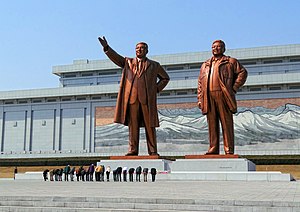
Back عبادة الشخصية الكورية الشمالية Arabic Προσωπολατρεία στη Βόρεια Κορέα Greek Culto a la personalidad en Corea del Norte Spanish Culte de la personnalité en Corée du Nord French פולחן האישיות הצפון קוריאני HE Kultus individu Korea Utara ID Culto della personalità in Corea del Nord Italian 北朝鮮の個人崇拝 Japanese 북한의 개인숭배 Korean Culto à personalidade na Coreia do Norte Portuguese

The North Korean cult of personality surrounding the Kim family[2] has existed in North Korea for decades and can be found in many examples of North Korean culture.[3] Although not acknowledged by the North Korean government, many defectors and Western visitors state there are often stiff penalties for those who criticize or do not show "proper" respect for the former leaders of the country, Kim Il Sung and Kim Jong Il,[4][5] officially referred to as "eternal leaders of Korea". The personality cult began soon after Kim Il Sung took power in 1948, and was greatly expanded after his death in 1994.
While other countries have had cults of personality to various degrees, the pervasiveness and extreme nature of North Korea's personality cult surpasses that of both its original influences, Joseph Stalin and Mao Zedong.[6] The cult is also marked by the intensity of the people's feelings for and devotion to their leaders,[7] and the key role played by a Confucianized ideology of familism both in maintaining the cult and thereby in sustaining the regime itself. The North Korean cult of personality is a large part of Juche, the official ideology of the country.
- ^ "North Korea pays homage to the Kim dynasty, past, present (and future?)" Justin McCurry. The Guardian. London. 17 December 2012. Accessed 18 August 2017.
- ^ Williamson, Lucy (December 27, 2011). "Delving into North Korea's mystical cult of personality". BBC News. Archived from the original on February 2, 2013. Retrieved January 9, 2013.
- ^ Choe, Yong-ho., Lee, Peter H., and de Barry, Wm. Theodore., eds. Sources of Korean Tradition, Chichester, NY: Columbia University Press, p. 419, 2000.
- ^ Ben Forer (January 12, 2012). "North Korea Reportedly Punishing Insincere Mourners". ABC News. Archived from the original on April 14, 2012. Retrieved January 9, 2013.
- ^ "DPRK, Criminal Penalties". US State Dept. December 2, 2011. Archived from the original on January 1, 2013. Retrieved January 9, 2013.
- ^ Armstrong, Charles K. (2013). The North Korean Revolution, 1945–1950. Ithaca: Cornell University Press. p. 222. ISBN 978-0801468797.
- ^ Hunter, Helen-Louise (1999). Kim Il-song's North Korea. Greenwood Publishing Group. p. 25. ISBN 978-0275962968. Archived from the original on January 11, 2014. Retrieved August 31, 2013.